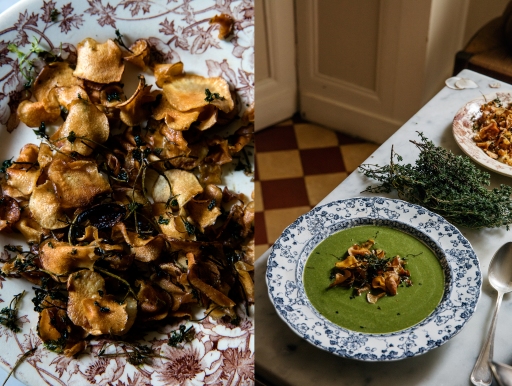‘Fasting is the act of abstaining from all or some kinds of food or drink within a specific period of time’

Image credit – Mimi Thorisson
When I implement a health and personal growth tool, I want the benefits to be ‘stacked’. That is, I want to receive multiple benefits across several dimensions for a single activity- be these biochemical, psychological or quantum. A ritual where I feel both challenged and enriched in a multi-dimensional way is fasting. Below I’ll be outlining the significance of fasting in the Christian-Greco-Roman traditions, the physical benefits of fasting and the personal fast that I’ll be taking this Lenten season. I will be following a regime that pairs historical methods of fasting with the current science in order to obtain the best health benefits.
I want to start by saying that I’m writing this post in time for the Lenten season (the time where Christians fast to prepare their bodies, minds and souls for the Easter celebration). Religious beliefs aside, I am an advocate for honouring your culture and the rituals practised by your ancestors. As I am of pan-European descent, I can comfortably guess that my fore-mothers and -fathers practised this tradition of Lenten fasting for possibly several hundred years. Culture is a delicate thing, much like a fire that one must tend to keep from going out. I don’t think that we should be so careless about disregarding the rituals and beliefs that bread our civilisation before fully understanding them and their purpose. More on this is later posts.
Fasting enables us to transcend our addiction to food and face our demons square. In everyday life, people use food much like a smoker turns to cigarettes or a drinker to the bottle: to mask an uncomfortable feeling. In terms of calories, we don’t need as much food as we consume. Humans are designed to endure periods of famine and hardship, and all this abundance has made us soft around the edges. When you’re no longer turning to food for comfort, then you can really see what’s making you uncomfortable. Sit and be quiet with yourself. Fasting as a tool to accelerate personal growth is recognised by almost every spiritual tradition going back millennia. How deeply can you penetrate personal and global truths when a portion of your focus is consumed by where the next calorie hit is coming from?
Fasting is a fantastic tool for increasing physical and mental focus. When you’re hungry, your body goes into survival mode – your cells repair themselves, you burn fat for fuel, and you release growth hormones for muscle and organ reparation. The tool of fasting has been used to sharpen some of the greatest minds of history. In fact, Pythagoras fasted for 40 days before his examination at Alexandria. Plato and Socrates also fasted to increase mental prowess.
I also believe that discipline is a muscle, and like all muscles, is sharpened with resistance. Limiting the variety and the times at which you consume food is an interesting experiment in discovering what subconscious or involuntary habits you have that don’t serve you. Discipline in general is an important skill which is vital to success in all areas of life. Studies have even found a positive correlation between high intelligence and self-control. It could be that each time you’re required to delay gratification or exercise discipline, it’s like a mini brain-training drill which sharpens your mental control and will-power. Fasting, especially for long periods of time, is like a marathon for your will power, and a step towards self-mastery.
The health benefits of fasting are well documented, but I implore you to experience these benefits for yourself. It decreases inflammatory markers, improves heart health by boosting circulation, boosts brain function and could prevent neurodegenerative disorders, boosts metabolism and, most importantly, could delay ageing and increase longevity (due to it’s ability to repair mitochondria) . Many human and animal trials which record these benefits consist of periods of intermittent fasting and calorie restriction which last up to and over one month. This time-frame correlates perfectly with the Lenten period.
This year, I’ll be following the medieval Lenten rules, as outlined by Saint Thomas Aquinas. This particular fast combines intermittent fasting (only eating between specific set times during the day), partial fasting (denying yourself specific foods) and two separate 24-hour fasts. Because all animal products are off the table, it means my diet will be almost completely plant based. I thought this would be a great time to supercharge my diet with vitamins and minerals. I will also use this time to reset my intention of eating only organic produce.
The rules of the Saint Thomas Aquinas fast are as such:
The season begins on Ash Wednesday with a 24 hour water fast (or what they referred to as a ‘black fast’).
The second 24 hour fast will be on Good Friday – the last day of the fasting season.
No animal meat or fats, eggs or dairy products are to be consumed for the Lenten period.
Although wine and beer were allowed in medieval times, I would guess that this could be due to sanitary limitations of water at that time. So for me – no alcohol of any kind will be drunk for the Lenten period.
No food is to be had from waking until 3 pm. This will be the biggest challenge of the fast for me, but also the component which will reap the most benefits – both physically and psychologically. I am open to breaking my fast at 12 pm on some days in order to make the fast more sustainable with my work and exercise regimes.
Fish and other sea foods can be eaten on Fridays.
I’ll be taking a daily multivitamin and pro-biotic, though abstaining from my usual omega-3 fish oil.
I will meditate every morning and give thanks to my ancestors for the sacrifices they have made in order that I may live.
So there you have it. This is my personal fast for the Lenten period. I’ll be posting updates and recipes on my Instagram. I recommend you following me there if you would like to get inspired. Will you be fasting this lent? Do you fast generally? I’d love to use the comments section to share ideas and to keep each other motivated through this time.

References:
https://www.ncbi.nlm.nih.gov/pubmed/23244540
https://www.ncbi.nlm.nih.gov/pubmed/26374764
If you want more information on fasting and longevity studies, I highly recommend the book ‘The Longevity Solution’ by Dr. Valter Longo.
